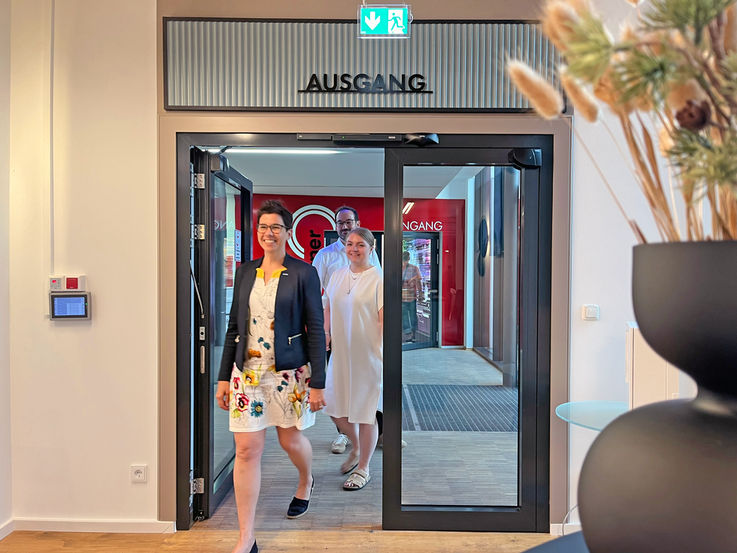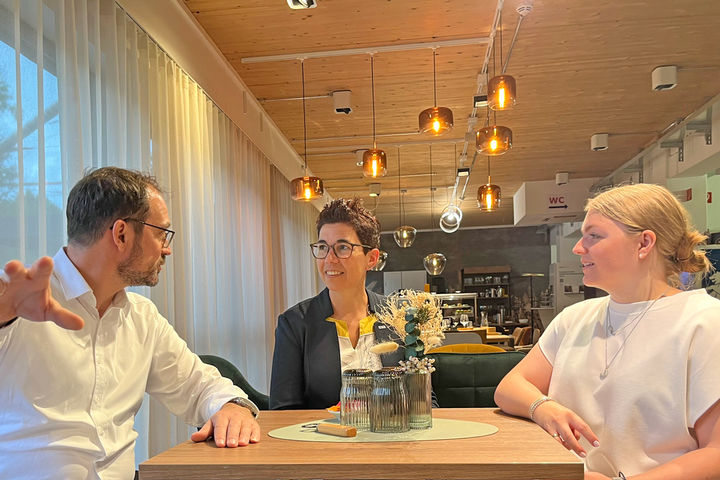Smart, sustainable and barrier-free - this is what the hotel of the future will look like
The Hotel Competence Centre (HKZ) in Oberschleissheim near Munich is something special in the German-speaking hotel industry: here, all areas of a hotel - from hotel rooms of different categories, to a fully functional bar, lobby and kitchen - run in test mode on a large exhibition area. Architects, planners, operators, leaseholders and investors can find out about concepts in hotel and restaurant construction from a wide range of manufacturers and exchange ideas at their leisure - away from the usual trade fairs. GEZE solutions are also used here and we receive valuable feedback on the use and handling of our products. Sonja Zdiarsky, our Global Account Manager and expert for the hotel industry, discusses the trends in the hotel and catering industry with the two operators of the HKZ, Julia von Klitzing-Peter and Christian Peter. They also talk about what characterises smart hotels, what guests and staff need and, of course, how GEZE products can help
"Smart Hotel" is the trend in the hotel industry
S.Z.: There's no getting around the term "smart hotel" at the moment. What do you think it means and what other trends are currently dominating the hotel industry?
Christian Peter: It's clear that almost everyone is about networking and automation in the operation of hotels. The terms "smart hotel" or "hotel of the future" are often used in this context. Smart hotel is about equipping a hotel with artificial intelligence in order to optimise its management and efficiency and thus improve the service in the hotel on the one hand, but also save costs on the other hand. But from our point of view, the so-called smart hotel or hotel of the future already exists; it should actually be called the "hotel of the present". This is because most of the digitalisation solutions are already in place, but the potential is not yet fully exploited, as networking and therefore communication between the individual trades is still problematic. This is mainly due to the fact that the individual trades are not considered and planned together from the outset, but are added too late so that a structural solution can no longer be taken into account.

Door closers and other GEZE products in live test operation: In the hotel competence centre, our customers have the opportunity to experience all products. © GEZE GmbH
S.Z.: What should the planning of a smart hotel look like so that networking works?
C.P.: Architects, interior designers and the relevant specialist planners for heating, air conditioning, sanitation, ventilation, fire protection, etc. are all involved in the construction process. They need to liaise with each other at an early stage, ideally moderated by the tendering process. Otherwise, the technical systems are very often incompatible afterwards - simply because there is a huge number of different systems and protocols. Ideally, the systems must therefore be interoperable.
S.Z.: We can absolutely confirm that. The technical systems work best with good planning and early coordination between all those involved. We attach great importance to this in our projects. What advantages do you think smart hotels offer to the operator?
C.P.: One of the most important reasons for networking building technology in hotels is the sustainability aspect, or more precisely, energy efficiency. The hoteliers need precise data on energy consumption in order to balance or shift peak loads, for example. For example, they certainly can't restrain the power of the coffee machine in the morning, but they can use building intelligence to tell the tumble dryer to switch from 90 % to 60 % heat output or even to move the entire drying process to the night-time hours. At the same time, networking can increase comfort and safety in the building by optimising building processes. For example, through automatic ventilation or barrier-free door solutions that nevertheless guarantee a high level of safety for guests at all times, for example in the event of a fire, as well as the possibility of remote access for status monitoring or access control. For these many small applications, we need a building management system into which the individual systems can be integrated. Solutions such as the myGEZE Control networking platform, which can be used to integrate the door and window drives into a building management system in an open system, are of course ideal here.
Sustainable hotel operation
S.Z.: We will soon be networking the existing doors in the Hotel Competence Centre with myGEZE Control. Then both the doors and the products of other companies can be integrated into a building management system and the benefits can be demonstrated live to visitors. This makes the theory a little more tangible and is the great advantage of the Hotel Competence Centre. Moving away from technology, what other trends are you seeing in the hotel and catering industry?
J.v.K.: In addition to technology, different guest needs are coming into focus. What do my guest groups expect, what might young people value in contrast to the current target group? The younger generation in particular is focussing on sustainability, which means that a conscious decision in favour of sustainability and regionality is a new form of luxury. On the one hand, as already mentioned, building automation comes into play here in order to make the operation of a hotel more sustainable, but the demands go beyond that. The concept of luxury has changed completely. In the past, luxury meant large, opulent and richly furnished rooms and spaces, whereas today it is the opposite, i.e. simple, minimalist and functional design. In addition to sustainability, barrier-free hotels are also a trending topic. The World Tourism Organisation (UNWTO) estimates that the market for accessible tourism accounts for around 15 percent of total global tourism expenditure. This figure is expected to rise further as more and more countries and destinations improve their accessibility. Accessibility no longer only affects people with disabilities, but also older travellers, families with children or simply guests travelling with their luggage. Everyone benefits from accessible hotels.
For the younger target group in particular, a conscious decision in favour of sustainability and regionality is the new form of luxury.
Julia von Klitzing-Peter, expert for generations Y/Z at the Hotel Competence CentreS.Z.: What does the trend towards sustainable and barrier-free hotels mean in concrete terms for hotel rooms?
J.v.K.: That I have much less furniture, for example. The furniture has to be well thought out and really only limited to the bare essentials. For example, only small side cabinets, a compact desk and a luggage rack and not a great deal more - all in one colour, in one material and preferably from the region without long supply chains. And all of this in an ideal, pleasant and quiet room climate. This is where the installed products, such as the GEZE TS 5000 SoftClose door closer or the GEZE ActiveStop, come into play to prevent the doors from slamming shut loudly. Accessibility in the hotel, on the other hand, starts at the entrance door, for example with automatic sliding doors such as the Slimdrive SL NT or the Revo.PRIME revolving door, and continues in the hotel rooms. Here, for example, sufficiently wide passageways for wheelchairs, non-slip floor coverings and digital communication media in the rooms create inclusion. The great thing is that all these measures not only create barrier-free hotels, but also increase comfort for guests.
S.Z.: Hotel guests demand sustainability, but how can you get them to act more sustainably themselves, especially when it comes to energy and water consumption?
J.v.K.: Well, there are now very clever ideas on how to motivate hotel guests to be more economical and conserve resources. For the Gen Z in particular, we are seeing interesting developments in the direction of gamification. For example, guests can win "coins" for their thrifty behaviour, which they can then spend on a free breakfast, for example. This is also interesting for the operators, as breakfast then pays off for them - through the kilowatt hours of electricity or litres of water saved. For the large hotel chains in particular, such reward programmes are a great way of building customer loyalty. But of course what I need for this - and this is where the circle closes - is networking of the systems and a high degree of digitalisation.
Barrier-free hotels enable robotisation

Not only fire protection, sound insulation and emergency exit protection - the hotel competence centre is also concerned with predictive maintenance. For example, the door closer should not be serviced just when the conference guest has booked the conference room. © GEZE GmbH
S.Z.: Apart from operators and guest - how are hotel industry trends affecting hotel staff?
C.P.: Of course, the topic of sustainability also has an impact on the employer brand. It is increasingly the case that employees are less concerned with money than with purpose and work-life balance. I prefer to work in a hotel that operates sustainably and, as a hotel employee, I value fixed working hours and reliable rest periods. And here we are in the middle of the skills shortage that has hit the hotel and catering industry since the COVID pandemic. However, another trend that we haven't talked about yet can help here: robotisation. You can already use robots in many areas today - just like in the hotel of the future - if you have the technical means to do so. Incidentally, robots are also happy about barrier-free hotels. This is precisely why it is so important for us and the entire industry to work together with technology partners like GEZE. For example, if the cleaning or service robot is to travel from room to room, then I need automatic door drives that are ideally controlled via the building automation system, for example to keep the doors open at certain times and close them at other times when the robots are inactive. In most cases, neither the operator, nor the fabricator, nor the architect knows how this communication can work - the experts like GEZE have the knowledge. In our usability lab here, we can play through and present the Guest Journey.
Not only do the systems have to communicate with each other, the trades also have to coordinate with each other. We share this 'Connecting Expertise, Building Solutions' approach with GEZE.
Christian Peter, founder and initiator of the Hotel Competence CentreS.Z.: So why have so few smart hotels been realised with robots so far?
C.P.: Again, this is due to the large number of systems and protocols - and ultimately to the uncertainty as to which system will prevail. After all, who wants to invest in something that they don't know whether it will still be on the market in the next 10 or 15 years? And many simply don't have the time to keep up with the exponentially advancing innovations - the topic of AI has also contributed to an acceleration here. In this context, dialogue is essential for decision-making. With the Hotel Competence Centre, we are providing a stable platform for this exchange - and we are delighted that GEZE is part of this exchange of experts!
We are delighted about that too! Thank you very much for the interesting conversation, Mrs von Klitzing-Peter and Mr Peter, but above all for the good partnership and the shared interest in driving the hotel industry forward.
GEZE has been a partner in the Hotel Competence Centre since 2022. We are happy to invite our customers, partners and interested parties to take a closer look at our products in use here at any time.
Are you curious? Then make an appointment now:
By telephone on 089 55 05 212 0 or directly via the contact form.



